Student Introductions
Taro Futamura (35)
I am a full-time Research Associate at a university. I studied abroad from August 2001 to December 2007 in the Geography PhD Program, Department of Geography, University of Kentucky. I had a J-1 visa.
Yohtaro Hamada (45)
I am an editorial reporter for Asahi Shimbun. I was recruited after college and have worked here for the past 20 years. I studied abroad from 2001-2002 at the University of Minnesota through the Fulbright Journalist program. Fulbright Japan funds experienced journalists as visiting scholars to U.S. institutions for 6-9 months of research. I had a J-1 visa.
Junko Hirakawa (36)
I am a Political Affairs Officer at the United Nations, New York. I studied abroad from May 2000 to May 2002 at The Fletcher School of Law and Diplomacy, Tufts University, Massachusetts, in the Master of Arts in Law and Diplomacy (MALD) program on a Fulbright. I had a J-1 visa.
Yosuke Ito (23)
I am a senior at Lakeland College Wisconsin (LCW). I have been there for a year and a half. After high school I went to Lakeland College Japan (LCJ). I did three years total at LCJ, but I had to study English before I could study anything else. Then I studied Academic Issues at LCJ for my second and third years. The school helped us apply for F-1 visas.
Kumi Kashimoto (25)
I took an exam to be a teacher a week ago, and I’m awaiting the results. After I graduated from university, I studied abroad. I was in the U.S. for 2 years on the CCP program from Youth for Understanding (YFU). My program provided a home stay, some ESL classes, some classes on campus, airplane tickets, and insurance. I think I had an F-1 student visa.
Ryoji Kodera (27)
I am a consultant for a company, and I tutor college students for their job search and company recruitment. I went to the U.S. in 2004 and graduated May 2005. I studied at Lakeland College Japan two years and two years at Lakeland College Wisconsin. I studied education. I had a student visa.
Rie Kofuji (31)
I am a director for a news program. I studied abroad from 1997 through 2003. University of California, Irvine, ESL Program (1997-1998); Santa Ana Community College, Communication Major, Journalism Broadcasting (1998-2001); California State Univ. Northridge, Cinema Television and Art Major, TV Production (2001-2003). I had an F-1 Visa.
Minami Nakase (21)
I study economics as my major and education possibly as my minor, and maybe a psychology minor at Lake Forest College. I’m a sophomore now, and I’m going to be a junior in August. I have an F-1 student visa.
Sachiko Ohde (32)
I am a clinical researcher at St. Luke’s International Hospital. I studied abroad for three years from 2003 to 2005. I did graduate studies at Boston University on a Fulbright. I was 25-26. I had a J-1 visa.
Yusuke Sato (21) and Mariko Ishii (21)
We are students at the same university. Our major is hospitality management – hotel management. We’re attending the University of Nevada Las Vegas. We went to Japanese high schools, but then went to Lakeland College [in Japan] for two years after graduating from high school. We plan to study abroad for two and a half years. We have F-1 visas.
Naoyuki Tsuji (22)
I am studying abroad at Minnesota State University. I am a freshman and a transfer student. I could transfer almost 50 credits [from my college in Japan], but I still need three years to graduate because I am studying athletic training. I have an F-1 visa
Tsubasa Wakabayashi (38)
I am a Research Fellow at a university in Germany. The first time I studied abroad was at the Law School of the University of Wisconsin at Madison, 1994-1995, as an exchange student, full time. The second time was at the Law School of UCLA, 2001-2002, LLM program. For Wisconsin, I think I had an F-1 visa. For L.A., I had a J-1 visa.
Preliminary Questions
1. How was your experience?
Hirakawa:
It was extremely rewarding – there is no doubt that my experience in the U.S. led to my career at the U.N. Aside from career-wise, it gave me a chance for personal growth and changed my way to view the world.
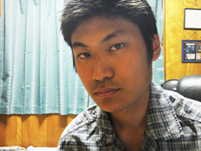
Yosuke Ito
Ito:
For me the first week was very scary because everything was different from Japan. It was almost January. It was the middle of the cold winter; everything was white, covered by snow. We rarely see snow in Japan, so it was really cold. The college is in the middle of nature. It’s the total opposite of Tokyo. Everything was different.
Kodera:
It was great! It was the most important experience during my studies. After I went to the U.S., I decided to belong to the American football team. I was probably the first Japanese player in [Lakeland College] history. I played in some of the games. I didn’t have any experience with American football. The first time I was very nervous. The other American players were very welcoming to me, and I was taught many things so it was very good.
2. What was the best part?
Kofuji:
Being able to meet so many different people. There are people of so many different races living in the U.S., so I was able to meet people with a wide variety of different values. Talking to people such as Hispanic Americans and Asian Americans who immigrated to the U.S. in different situations made me want to know more about what’s going on in the world and learn more about history. I was able to gain a wider perspective by seeing people living in different circumstances.
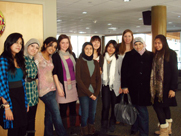
Minami Nakase studies with a diverse group of people at college in the U.S.
Nakase:
I think it’s just friends, like when you meet someone who you can talk to about your interest, and they respond to you very honestly. I think that’s the best part. I think before studying abroad, to be honest, I wasn’t that much of a good friend because I had my family and in high school you’re always thinking about yourself. In college you’re always with somebody. You see their other side when they’re upset or not feeling well, and you start to notice that everyone is an individual. You have to respect them and trust what they do. I’ve learned a lot, like how to be a good friend.
Sato:
Japan is an island, isn’t it? Although there are some Asian people here, the majority of the people are Japanese and the culture is Japanese. I think I had come to dislike Japan. Everyone’s the same and everyone has the same kinds of ideas and memories. I think I just got bored with Japan. Then when I went to the U.S., I started to realize that Japan is a good country. By leaving my own country, I was able to see for the first time that Japan is a great country. Up until then, I hated the subways because they were packed with people, but when I came back I realized that Japan is really convenient. You can go anywhere in Japan without needing to drive. By leaving Japan I was able to understand what’s good about my own country for the first time. That’s the best thing about studying abroad.
3. What was most difficult?
Ito:
It’s the language. Sometimes I take classes and I can’t understand what professors are saying because they speak very fast. Sometimes I can’t catch it because I am writing. All my classmates are American, so I am the only one that doesn’t understand, but I get help. Sometimes, I use office hours, asking professors, “What did you say?” They are very helpful. Talking with professors is fun and interesting.
Nakase:
To accept cultural differences [is most difficult] because in Japan you don’t have to think about cultural differences or races. When you go abroad you have to be more sensitive about what you do and be responsible for what you say. Sometimes even if I try not to, I might be doing something that’s kind of racist. So I try not to do that and try to meet a lot of people from different backgrounds.
Ishii:
It’s just daily life. You have to move away from your parents and do everything by yourself. You have to do your own laundry and if you want to live in an apartment, you have to sign your own apartment contract.
4. How has your experience benefited you?
Kashimoto:
I’m so happy that I could have conversations with foreign people because then I could understand their opinions or views. And now, I have many friends all over the world!
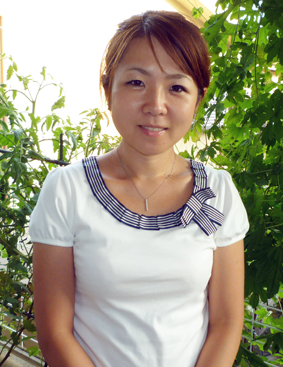
Rie Kofuji
Kofuji:
Becoming more proficient in English and being able to study in a field that would lead to my current work was important. However, I also gained confidence by overcoming many difficult situations and problems despite cultural differences. After that, when I came across a problem, I felt motivated to try to face any challenge and deal with it instead of giving up right away.
Wakabayashi:
I know now there are a lot of different lifestyles and perspectives besides the ones which are widespread, the so-called “normal,” in Japan or Germany. In deciding what I should do, I can ask and think about myself, my family, and the important people around me, without getting so influenced by those fixed notions.
5. Why did you study abroad?
Nakase:
It’s just a feeling that if I studied in Japan, I wouldn’t be able to gain a satisfying four years of college life. I felt that if I want to find something I really like and find something to really excite me, I should go outside. I just felt nervous [about] going to college or university [in Japan] because it’s really big and you have to decide your major before you go in. I’m sure that way is good, too, but I just felt that it wasn’t for me.
Wakabayashi:
The first time, I just wanted to go abroad and see how it is in the United States. I wanted to live alone, study alone, and see everything outside of my little living [space] to experience as much as possible without any everyday work or disturbances.
Questions from “American View” Readers
1. A reader in Osaka: Did you already know what you wanted to study? How did you decide what you wanted to study and where best to go to study it?
Hamada:
Public journalism was what I was interested in. I was interested to study more on it and to see if there’s anything that newspapers and journalists could do to get people more involved to maintain the social security system and sustain the aging society. I thought it was a good tool that I could use in Japan. After I got the Fulbright, I looked for an institution that would accept me as a visiting scholar. I had never been to Minnesota and two of the newspapers in Minnesota had been very interested and enthusiastic about the idea of public journalism.
Hirakawa:
I was already enrolled in a graduate school in Japan in the same field (international relations). I did not have any problem in deciding what to study in the U.S. I narrowed down the schools by examining the objectives of the programs (e.g. professional or academic program), types of courses offered, faculty members, and alumni. These types of information were easily accessible on the Internet.
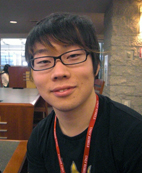
Yusuke Sato
Sato:
When I traveled before, I used to notice the tour guides because I couldn’t speak any English back then. When I went to Australia, I was so impressed that they could speak three languages, including the local language and the aborigine language. I thought the hospitality industry was a good field and I became more and more interested in it. Then I checked where the famous universities are and I found out that there aren’t many Japanese universities that offer hotel management. That’s what sparked my interest in the U.S. and I thought UNLV might be a good place for me. I started thinking about what to do and how I could go there. I found out that if I went to Lakeland first, I could transfer to UNLV from Lakeland.
2. A student in Ibaraki: Did you receive financial aid of some sort such as a scholarship, grant, or fellowship? If so, which and what did it entail? How did you find it?
Hirakawa:
Yes, I received three scholarships during my study in the U.S. The Fulbright Scholarship covered the insurance and travel, the Rotary Scholarship the tuition, and the Japan Scholarship (Nihon Ikueikai) the living expense. I found the lists of scholarships for foreign study on guide books, websites, and information centers. I also took advantage of advice of those who had won those scholarships when I was preparing the applications.
Nakase:
I am a Grew Bancroft (GB) Foundation scholar. The college pays me a scholarship grant as a GB scholar.
Tsuji:
I got a scholarship. The Minnesota State University gives scholarships to all international students, but we have to do culture contributions in return such as volunteering at the school. We have to volunteer about 30 hours and we also have to maintain our GPA [at a certain level]. Then we can get the scholarship.
3. A reader in Toyama: Did you have a part-time job? How did you find it? What was it like? What types of part-time jobs were most common?
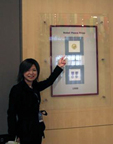
Junko Hirakawa points to a Nobel Peace Prize at the United Nations
Hirakawa:
I did a summer internship at the United Nations in June-August 2001. I obtained specific information on the internship from the U.N. website. During the internship, I was assigned to one of the Departments at the U.N. Headquarters in New York and given specific assignments to complete by the end of the internship period. I also used this opportunity to meet alumni working at the U.N. and to attend public meetings and lectures held at the U.N. Many other fellow students sought internship opportunities at NGOs, particularly at their field offices.
Ito:
We can have part-time jobs on-campus, but we can’t have part-time jobs off-campus. It would actually be violating the law, the visa laws [to have a job off-campus]. I worked for the newspaper.
Sato:
Hotel management majors can’t graduate if they don’t fulfill the requirement of 1,000 hours of work experience. In a situation like that, you can go to the International Student Office, and say that you need work experience. They’ll give you something called a temporary social security number and you can do part-time work.
4. A reader in Tokyo: Were you married at the time you studied abroad? If yes, did your family go with you? Did you have trouble finding housing, financing your trip, etc?
Hamada:
Yes, I am married, but I don’t have kids. My wife and I actually went together. We spent 11 months altogether in Minnesota. Before we departed for the U.S. there was more than half a year and I’m not sure if this is a Fulbright program, but the Embassy of the United States [in Tokyo] arranged an event. They invited Japanese families who are going to go to the U.S. and U.S. families who had just come to stay in Japan. Through this event we got to know an American family who had come to Japan. They had a house in the suburbs of Saint Paul, Minnesota. They were [planning] to go back to Minnesota after a year and only needed to rent out their house for that period. We were only going for one year, so it was a really good match. We had actually looked for an apartment on the web, but I was so lucky to get to know this family. We moved into their house right in a neighborhood of everyday middle class people.
5. A reader in Toyama: If your family went with you, was it hard to get a visa for them? Did your spouse work? How did they like it?
Hamada:
No, especially if you are a Fulbright scholar, I think that you can get the necessary documents [for a visa] easily. [My wife] actually studied English as a Second Language (ESL). I think that the University of Minnesota has a very wonderful ESL program and she encountered very good teachers and very good classmates. They have a buddy program with the local students, so [my wife] paired up with a college student. She’s very, very nice, so they became very good friends. They still exchange Christmas cards and gifts. My wife, she really enjoyed being in Minnesota. She probably enjoyed our experience more than I did. I was just so relieved that my wife was outgoing, made friends, and had fun, so I didn’t have to worry about my wife being lonely.
6. A student in Tokyo: Did you have to budget financially while abroad? What do you recommend others do to be frugal?
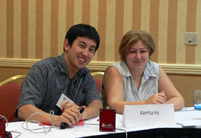
Taro Futamura participates in an event as part of the Kentucky delegation during graduate school.
Futamura:
It depends on the school dormitory service, but it turned out that the dorm was rather expensive at my university. Room sharing at an apartment was cheaper than living at a dorm or elsewhere by myself. You do not have to stay in the same place for the whole time, so ask around and find out how much the average rent is. For various reasons, including rent, I lived in five different places over six and a half years. Also, I cooked my meals most of the time instead of eating out, which I not only enjoyed, but I also saved a lot. Finally, for furniture and clothing, shop around at local garage sales and thrift shops such as Goodwill and the Salvation Army. Not all of the products are in the best condition, but if you want to save, you can buy stuff at much cheaper prices.
Hirakawa:
Even if you are not financially challenged, living in a dorm is highly recommendable for Japanese not only for cost-saving, but also for in-depth understanding of American culture and close communication with fellow students. I learned several cost-saving techniques (e.g. use of coupons) from my fellow students.
7. A reader in Toyama: Did you get homesick? If you did, how did you deal with it?
Nakase:
[When I feel homesick] I just let it pass by. [I] talk to my parents through Skype and do what [I] can at that moment and let the rest of it pass by. Go out, hang out with friends, just chill, or look at photos. I feel that when you become homesick you tend to be inside yourself, like in your room always or staying in one place. So if you make a little change in your daily life like go out somewhere new, I think that would soften that kind of homesickness.
Sato:
I felt a little [homesick]. Right before I came back to Japan, I really missed Japan. This is my first time to come back to Japan. I’ve been there for a whole year without returning to Japan. [When I feel homesick,] I call people and use Skype. You can see their faces and it’s free. When that’s not enough, I talk to friends from the same country.
8. A student in Tokyo: Did you get culture shock? What was it like? Did it go away?
Hirakawa:
As it is often said, the Japanese culture requires people to be extremely punctual and customer-centered, so it took me a while to get used to a less punctual, carefree culture. Initially, I found American people quite lazy and I was often irritated with their tardiness. But eventually, I started thinking the other way round, that is, there was too much time pressure in Japanese society and it might be healthier to be free from such pressure. This experience ultimately helped me work in a very diverse culture, such as at the U.N.
Ohde:
Boston is really a big city, so I didn’t feel culture shock that much. There was nothing I couldn’t find, if I wanted Japanese food, Chinese food, Italian, or Korean. I recommend that students going to the U.S. try to say, “Teach me. I don’t know.”
Sato:
I think the first thing is the food. Since I’ve been in Japan for 20 years, I’m used to eating Japanese food. We eat a lot of fish in Japan, but meat is more common there. Also, the flavoring isn’t simple; it’s very complex. It tastes different and that was sort of hard for me. But I’ve gotten used to it now.
9. A reader in Kyoto: Did you run into an emergency such as an injury or illness? If yes, what happened? What did you do?
Kofuji:
I was living alone when I became ill suddenly after 11 p.m. I was afraid that if I went to the emergency room it would be really expensive, so I just took some medicine I had at home and waited until morning. The next day I went to the hospital. I think it is important to sign up for insurance if you plan to live in the U.S.
10. A student in Tokyo: Did you encounter prejudice/stereotypes/discrimination? If so, how did you deal with it?
Ito:
Yeah, just a few [times]. It’s kind of discrimination against all Asians. Like when I was living in the student dormitory, I heard a voice from the room next door. I heard, “Go back to your country, you Asians!” I talked to my advisor, and she helped me solve the problem. I recommend talking to someone else if you get culture shock.
Nakase:
I had stereotyping more from people from neighboring countries than from people from America. People from China and Vietnam, maybe because they have more interest in Japan, they kind of had an image of a Japanese person, especially for Japanese girls. [They would ask me questions like:] “Is your fashion like that?” or “Do you prefer doing that?”
11. A Student in Aichi: Did you transfer schools? If so, how was it? Did you find anything particularly difficult?
Kofuji:
I transferred to a university after first studying at a community college. I didn’t find it particularly difficult. I had already decided to transfer to a university when I entered community college, so I consulted with a transfer counselor when selecting my classes. I didn’t have any problems when I transferred.
Sato:
It was sort of difficult. You really need to have a TOEFL score of 550. I went to the U.S. Embassy to take care of my visa and that was hard. It takes quite a long time. It was difficult to figure it out online. I didn’t know what an F-1 visa was at first. I thought there was only one type of visa. I had no idea there were different types of visas.
12. A student in Saitama: Did you feel safe when studying in the U.S.? Was there anything you did as a precaution?
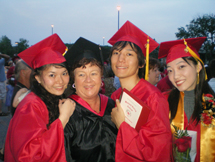
Kumi Kashimoto (at left) at her college graduation ceremony
Before I went to the U.S., I was scared of guns; however, it was totally safe.
Kodera:
I didn’t feel like it was dangerous, probably because I live in the [U.S.] countryside. I’m from Hokkaido, so it’s a very similar place.
Kofuji:
The reason I decided to study in Irvine was because it is a safe place. The city of Irvine in California has one of the lowest crime rates in the U.S. I really hardly ever felt I was in danger when I lived there. But even though it has a low crime rate, I avoided walking around at night and was careful not to do anything to put myself in a dangerous situation.
Wakabayashi:
In Wisconsin, I felt safe. There were very good services at my school there such as a free bus at night from the libraries to the dormitories, escort service, etc. I used them often. Before going to L.A. I was really afraid. So I chose the area which was known as the safest to live. I had a car and did not go to dangerous places (downtown, for example), especially alone at night. However, I felt okay about my safety after I had been there for a while.
13. A student in Tokyo: Was it hard making friends? What do you think is the best way to meet more people?
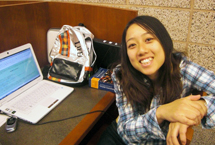
Mariko Ishii
I think it’s important to get along well with your roommate, both in terms of living together and studying. At first nobody has any friends, but it is really easy to make friends with your roommate since you spend time together every day.
Ito:
Yeah, I think for most Japanese it’s tough because of our culture. We’re really shy actually. I think that joining some organization at the college [helps]. We have a lot of these organizations so we can make friends through the organizations.
Tsuji:
During orientation MSU did a good program where we played some kind of [introduction] games and also had a party for the new international students. So I could make friends easily.
14. A reader in Kanagawa: What types of activities and events did you participate in? What do you recommend doing?
Hirakawa:
What I found unique was my experience as a member of a student panel on the selection of a new faculty member. When the school was going to recruit a new faculty member, it established a panel consisting of five students, which was deeply involved in the selection process, such as interviewing candidates, seeking candid opinions about candidates from their students, and making a recommendation to the faculty. I have never heard of such a deep involvement of students in the recruitment process of the faculty members in Japan, and I appreciate such a unique experience.
Kofuji:
When I was at community college, I joined a club for international students. There were events for international students and we went on trips together as a group. In university, I joined a club for people studying television production and film studies. We went to watch TV recording sessions. I also had an opportunity to meet people working in the television industry who had graduated from the university.
Wakabayashi:
I recommend the events and parties that the university offers or that students offer at the university. Then you will meet the students/people who have a similar background and field as you. Even though you are busy studying, you should try to join those kinds of events. It is more important than studying alone because you cannot do it – join events or meet interesting people – in Japan.
15. A reader in Kanagawa: Were there any English conversation support groups or interest groups outside of your schools? If yes, how did you find them and what did you do?
Kofuji:
I met with an American university student introduced to me by a study abroad support company about once a week who helped me with my homework. We also went to movies and had coffee together. I think some language schools offer similar programs as well.
16. A student in Aichi: If you went to community college, why did you decide to go there? How did you find the place you wanted to go? How did you apply for it?
Kofuji:
Because community colleges are less expensive – the tuition is about half [the cost of a four-year university]. Also, I think the required TOEFL scores for admission is lower than for a four-year university. I also heard that it’s common for Americans to earn the necessary credits for university at a community college and then transfer to a university. It was a natural progression for me to enter a community college and transfer to a four-year college. I chose my community college after researching all the colleges near my language school. I decided on the school after I found out that the college I graduated from offered the subject I wanted to study and that the college’s curriculum for that subject was superior. I also didn’t have a car at the time so I chose a school that would be easier for me to commute to by bus.
17. A reader in Toyama: Do you recommend bringing anything from Japan when you go to the U.S. to study abroad?
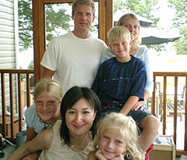
Sachiko Ohde in the U.S.
Hamada:
I actually recommend taking as many pictures as possible of your house in Japan, your apartment in Japan, your neighborhood, or your office. Just to show how you live and work in Japan. I wish I had taken more pictures of Japan to show my friends in the U.S. They were very curious and very interested to know about our everyday life. They always see pictures of Kyoto, Kamakura, or famous spots. So they’re curious to see your personal life.
Hirakawa:
Besides your favorite Japanese foods, you may wish to bring some Japanese medicines, as American ones might be too strong even under the same brand name.
Nakase:
I actually recommend not taking too much. For me, I took a lot of things just to be sure, but after living there I figured its way better to get things from that place. You can always share things with people and that’s better, I think, because if you have everything, you won’t have a chance to share. If you don’t have much you will be able to share things with people and get to know that person. That’s what I think now, looking back. I think you can blend in more easily.
Ohde:
One thing I had a really hard time with was finding a toothbrush. Japanese toothbrushes are very small and that is really comfortable for me. I couldn’t find them in the U.S., so I was using the kid-sized ones. Bring your own toothbrush. If it decreases your possibility of homesickness, that is an easy thing to do.
Sato:
Bring some Japanese books. Sometimes I really miss reading Japanese books. In the U.S. we use English 90% of the time. Sometimes you want to read you own country’s language, so that’s what I recommend. I plan to take some books when I go back next time.
Tsuji:
I recommend bringing traditional clothes like yukata and shoes like geta because I think most schools have international festivals. My school also has one, and I joined it, but I didn’t have traditional clothes, so I couldn’t wear [traditional] clothes or shoes. Other international students had their traditional clothes. They put their clothes on and I thought it was good.
Other Comments
Futamura:
Always keep in mind that going to study abroad in the United States is part of your life journey. If you get stuck with your travel preparations, studies, or other matters, think over the purpose of going to study abroad. One of the most important things for success in studying abroad is maintaining your goals and sticking to them. Not knowing the details of your goals is OK, but sticking to them is critical. Being responsible in your own decision to study abroad is essential. Without it, it is easy to fall down. Also, always have multiple people you can have casual and serious conversations with. You cannot decide everything in your life [alone], and suggestions from peers are always helpful. The more diverse [your peers], the better, I think.
Hirakawa:
When I was studying in Boston, I had a chance to watch the movie, “Pearl Harbor.” The movie reminded me of how much of a gap remained between the U.S. and Japan in the understanding of each other’s history and culture, even though there was increased communication between the two. Though it is a well-worn cliché, I would like to conclude by saying, “Seeing is believing.” I am fully confident that you will find something new in the U.S. At the same time, your presence will give American people an opportunity to learn something new about Japan.
Kodera:
I think Japanese people, everybody, should go abroad. Go at least one time, and it’s better at a young age. Especially Japan, many Japanese people see only Japan itself, and it is difficult to compare with other cultures, other countries, and other peoples. They just see Japan, so their view is very narrow, but if they see or feel other cultures or people, they can see other possibilities for their future.
Kofuji:
If you can study abroad, you should try to experience as much as you can instead of just studying during the limited time you have there. Be curious and try to participate in different types of activities. When I was a fourth year student at the university, I was able to work as an intern at three different companies. This was an important experience for me in which I was able to confirm what I wanted to do in the future. When you study abroad, I think setting goals is one of the keys to success. There were ups and downs during my time studying abroad and it certainly wasn’t only fun times for the whole six years, but I was able to do achieve my own goals by working hard.
Tsuji:
I think if someone wants to study abroad, they should know about religion [in the U.S.] and they should know about their [own] religion, too. Many people asked me, “What is your religion?” and I am not religious, so usually I say I don’t believe in any religion. They say, “Why?” Most of the students [at my school] are, of course, American, and they are Christian or Jewish. Sometimes there are programs about religions and it is kind of a serious program, so if [other Japanese students] don’t know about religions and say something wrong, it can kind of be troublesome.
Wakabayashi:
I believe going to study abroad is good in any case. Okay, there are people who are not suited to doing it. But at least it is worth trying. To know yourself, to get doubtful about yourself, to cheer yourself up, and to overcome difficulties will be important for the rest of your life no matter what kind of life you will lead. To make friends despite the differences of language and culture gives you a new perspective from which to see the world.







COMMENTS0
LEAVE A COMMENT
TOP